This opinion piece was or will be published in Caixin, Caixin (Chinese), Die Zeit (online), Kathemerini, Le Monde, Linkiesta, Finance (Slovenia).
One of the main drivers of this political phenomenon is arguably an increasing sense of insecurity in large parts of the middle class. Many voters for the surging parties come from a middle-class or working-class background. For example, support for Donald Trump is particularly large in the income group of less than $40000, followed by the income group $40-75000 . And while the theory of “angry-white-man” voting for Donald Trump may fall short of a full explanation of the changing voting behaviour, it is undoubtedly true that these groups of society are under pressure to preserve their status and stay in good jobs.
Data published by the Pew Research Center shows that the American middle class is losing ground. For example, the real income of the 60th percentile of a US household has not changed since 2000. In France, the issue may be less one of income inequality, which has barely changed but rather a growing sense of job insecurity. And while long-term unemployment has “only” increased from 2.8 to 4.4% since 2008, the French unemployment rate has been above 7% for 30 years now. Youth unemployment is also stubbornly high in several European countries.
This trend of increasing pressure on working population requires an adequate answer from established parties. So what is behind these pressures? One of the key issues to look at is the future of work. The share of labour income in national income has been falling in several advanced economies and most notably in the US.
The root causes of this fall in labour income are subject to debates. Some argue that the decline is a result of technological change that results in loss of jobs through mechanisation. Technological change undermines traditional business models through new sharing economy models. Trade integration, in turn, exposes the remaining workers to tough global competition. Political scientists have argued that there has been a shift in bargaining power towards capital. Others have highlighted that the lack of capital investment reduces the share of labour income by lowering productivity and thereby wages.
Irrespective of the reasons, a falling labour share raises important questions for the future of the welfare state. The welfare state has shielded households somewhat from the impact of increasing inequality and the risks of unemployment. Yet, the welfare state is based on taxation of labour income. With an increasing share of income going to capital, its revenue sources are under pressure – while unemployment and financial crisis weigh on the spending side and erode revenues.
Simple answers to these complex questions will fail, contrary to the claims of the surging parties. For example, closing borders to trade will only make imported goods more expensive and undermine our ability to export. This would be a heavy burden on many companies in France and elsewhere destroying jobs without bringing benefits. Migrants, in turn, are not only contributing daily to our economies but they are also net contributors to public finances and aging Europe certainly needs migrants to safeguard the welfare state that is under pressure from aging. Closing borders to any immigration would seriously undermine our economic performance.
Instead of such easy answers, informed debates and forceful actions are needed. The EU in particular needs to show that it can give answers and implement them effectively. If falling labour income is the result of a lack of capital, taxing investment would put further pressure on labour income. If, however, the robots are taking our jobs, we will need to find ways to make sure that robots (and their owners) pay. Yet, taxing capital owners requires cooperation across countries in order to prevent companies from avoiding taxes. This is a clear example of how the EU could show its effectiveness.
The EU was conceived as a way to address our common problems in a more effective way. In trade, it was designed to not only remove internal tariffs, but be a global player that can define clear social and environmental standards on imported products. In terms of mobility, internal border controls were removed to improve lives, but the adequate external border controls and better internal security cooperation were not built up. And yes, monetary union was started with inadequate structures in place and remains in need of repair and growth. In 2016, traditional parties need to deliver on the issues identified by the populists with informed answers.


